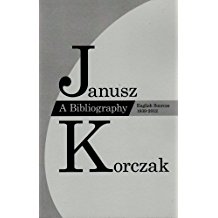
Bringing English-Language Sources of Janusz Korczak Together at Last
A review by Daniel L. Berek
There is an old piece of Hassidic wisdom that at any given time there are 36 tzadikkim, supremely good people. Their lives and deeds, it is believed, are such extraordinary examples of kindness and compassion that they hold the ability to redeem the world. Many who adhere to this philosophy unhesitatingly count Janusz Korczak (1879-1942) among these excellent people. Korczak devoted his whole life to children, as a physician, a writer of timeless books for and about children and, most recently, the founder and director of an orphanage in his native Warsaw, Poland, both in the city proper and, during the Nazi occupation, in that city’s infamous Ghetto. His final act of devotion was to accompany his wards to the death camp of Treblinka when the Nazis liquidated the Warsaw Ghetto, offering these children comfort in their last, terrifying moments.
That last episode, for better or worse, is often what leads people to ask, “Janusz who?” and find out more about this extraordinary man. Over the years, much has been written about Korczak, supplementing the many writings by the Old Doctor himself. However, many of these can be very hard to find. Janusz Korczak: A Bibliography – English Sources 1939-2012 addresses this challenge. This piece of research is the first major effort to bring together in a single volume material in English, both original and in translation (primarily from the Polish). This book is divided in two sections: “Writings by Janusz Korczak” and “Writings about Janusz Korczak.”
The first section, “Writings by Janusz Korczak,” comprises English-language translations of Korczak’s works for children and about children, especially on the rights of the child. The first part consists of books; the second part assembles translations published in periodicals. Over recent years, there has been somewhat of a renaissance in Korczak’s books for children, most of which are included here. For sources available online, the website URLs are included.
The second section, “Writings about Janusz Korczak,” comprises six sections, as follows:
- Documentary biographies, along with testimonies, diaries (mostly from the Holocaust), and memoirs that mention Korczak
- Conference proceedings, reports, and lectures on Korczak’s legacy
- Scholarly publications and reference books
- Articles in journals, magazines, and newspapers
- Books of prose, poetry, and drama in which Korczak is the primary character or plays an important secondary role (Plays that have been performed but not published are not included in the biography.)
- Accurate and reliable online source material.
Finally, three appendices are offered. The first contains published exhibits and catalogues. The second is a filmography; included are two films about Irena Sendler, with whom Janusz Korczak was intimately connected. The third provides websites of Janusz Korczak associations around the world. Many other websites on Korczak and his times exist, but these are not within the scope of this work.
Janusz Korczak: A Bibliography is noteworthy in that it is a piece of international teamwork. Dr. Edyta Januszewska is a professor from Poland; at the Warsaw Maria Grzetorzewska Academy of Special Education, where she teaches, she has participated in the many international conferences dedicated to Korczak and has worked with her network of colleagues in her research. Daniel Berek, on the other hand, is a former teacher in the United States. He holds a license in Special Education in New Jersey and works for a social service agency, nurturing children and young adults with all disabilities. Unlike Dr. Januszewska, he compiled his collection of Korczak resources solo, with no outside support. What both Dr. Januszewska and Mr. Berek share, however, is Korczak’s passion for the rights and dignity of the child, as do the editors, Olga Medvedeva-Nathoo and Galina Sanaeva, both of the Janusz Korczak Association of Canada, who assembled this valuable reference, a major undertaking. That these four individuals live and work so far apart is a testament to the power of Korczak’s ideas and the continued relevance to children throughout the world today. They share their love for Janusz Korczak in the hope that their efforts will inspire others to learn about Korczak and spread his timeless message.